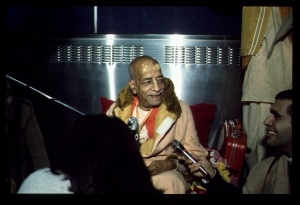CC Madhya 24.179

A.C. Bhaktivedanta Swami Prabhupada
TEXT 179
kirāta-hūnāndhra-pulinda-pukkaśā
ābhīra-śumbhā yavanāḥ khaśādayaḥ
ye ‘nye ca pāpā yad-upāśrayāśrayāḥ
śudhyanti tasmai prabhaviṣṇave namaḥ
SYNONYMS
kirāta—the aborigines named Kirātas; hūna—the Hūnas; āndhra—Āndhras; pulinda—Pulindas; pukkaśāḥ—Pukkaśas; ābhīra—Ābhīras; śumbhāḥ—Śumbhas; yavanāḥ—persons who do not follow the Vedic injunctions and who eat cow’s flesh; khaśa-ādayaḥ—Khaśas and others; ye—those who; anye—similar others; ca—also; pāpāḥ—sinful persons; yat—of the Supreme Personality of Godhead; upāśraya—of the devotees; āśrayāḥ—taking shelter; śudhyanti—become purified; tasmai—unto Him, Lord Viṣṇu, because of whom they become purified; prabhaviṣṇave—to Lord Viṣṇu, the most powerful; namaḥ—respectful obeisances.
TRANSLATION
“‘Kirātas, Hūnas, Āndhras, Pulindas, Pukkaśas, Ābhīras, Śumbhas, Yavanas and members of the Khaśa races, and even others who are addicted to sinful acts, can be purified by taking shelter of the devotees of the Lord, due to His being the supreme power. I beg to offer my respectful obeisances unto Him.’
PURPORT
This is a quotation from Śrīmad-Bhāgavatam (SB 2.4.18). This verse was spoken by Śukadeva Gosvāmī when Parīkṣit Mahārāja asked him for a description of the creation. While offering obeisances to the Supreme Personality of Godhead, Śukadeva Gosvāmī described the unlimited potencies of Lord Viṣṇu, who can purify the lowborn creatures mentioned herein.